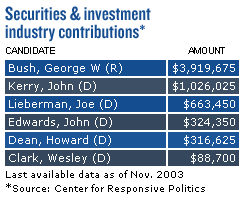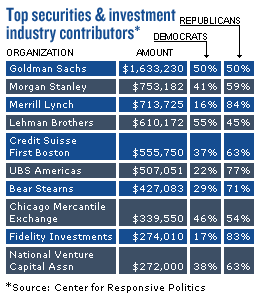NEW YORK (CNN/Money) -
It's an interesting contradiction: the perception of Massachusetts Senator John Kerry's potential "electability" as a presidential candidate makes him both Wall Street's most alluring and most dreaded Democratic contender.
Even before he won seven out of nine primaries and caucuses, judging by their donations, Wall Street firms were betting that John Kerry was the most electable of the Democratic candidates.
Members of the securities and investment industry have donated nearly $4 million to big-business friendly George W. Bush's re-election campaign, but have also donated more than $1 million to Kerry's campaign, according to the latest available data from the Center for Responsive Politics.

His nearest Democratic competitor, in terms of donations, was Joseph Lieberman, with about $660,000 in Wall Street contributions. With Lieberman out of the race now, Kerry's next nearest competitor is John Edwards, with about $325,000 in Wall Street contributions.
But before Kerry won in Iowa and New Hampshire, as well as five out of seven recent states holding contests, former Vermont governor Howard Dean was seen as the Democratic front runner, not Kerry. And while it's still early in the game to call the ultimate front runner, many see Kerry as now assuming that role, and this makes some on Wall Street a little nervous.
"On one hand, he seems more palatable to Wall Street than Dean, in that his positions on trade and taxes are more moderate," said Greg Valliere, political economist and chief strategist at Charles Schwab Washington Research Group.
"On the other hand, I think the markets weren't paying all that much attention to the Democratic race several weeks ago when it seemed like Dean would win, because in a Dean vs. Bush race, it was widely assumed on Wall Street that Bush would sweep," Valliere added. "But this changes things. Kerry's no Michael Dukakis. A Kerry-[John] Edwards ticket would be more threatening to Bush than Dean."
Kerry's platform
At this early stage in the campaign, it is unclear which of the policy changes Kerry has proposed would actually become policy if he were elected, and how those changes might impact the stock market.
In addition, studies show that regardless of the perception by many on Wall Street that Republicans are better for the stock market, stocks are in fact less volatile and perform better under Democratic presidents.

What can be scrutinized is how changes Kerry might make to the Bush Administration's $1.3 trillion tax cut might impact Wall Street, as Kerry has addressed this issue in some detail.
So far, Kerry has said he would repeal tax cuts he says benefit those who earn more than $200,000 annually, but would keep the cuts he says benefit the middle class. Compared to Howard Dean, who has vowed to repeal all of the tax cuts, Kerry's proposal may seem more market-friendly.
"However, you could argue that Kerry and all of the top-tier Democratic candidates want to repeal the preferential rate on dividends that was introduced last year and that the prospect of that rate rising might make Wall Street anxious," said Thomas Gallagher, a political economist at the International Strategy and Investment Group (ISI).
In his economic plan, Kerry has said he is against Bush's dividend tax cut, but that he would lower capital gains and dividend taxes for the middle class.
Among other things, Kerry's plan calls for setting up tax incentives that would encourage businesses to create manufacturing jobs in the United States. He has also said he would use the scaling back of the Bush tax cuts to reduce the federal budget deficit.
| RELATED SITES
|

|
|
|
|
For economists and market watchers worried about the impact of the tax cuts on the growing deficit, Kerry's talk of control over spending and repealing some of the tax cuts could be seen as market-friendly. Especially Kerry's promise to cut the deficit in half by the end of his first term in the White House.
On the other hand, for those who believe the tax cuts are directly linked to the 2003 stock market rally and the surging economy, Kerry's talk is worrisome.
"I think it would be difficult for Kerry to prove that the tax cuts were not effective," said Ned Riley, chief investment strategist at State Street Global Advisors.
In contrast with President Bush's big-business friendly image, Kerry's comments about going after pharmaceutical companies to lower drug costs, preventing corporations from keeping bank accounts in places like Bermuda, and increasing the minimum wage are a cause for concern on Wall Street, analysts said.
"This administration is seen as being very pro-investment, whereas Kerry is seen as wanting to rewrite the rules -- on capital gains, tax cuts on the wealthy, certain business regulations," Riley added. "I think, for market psychology, that would be damaging."

|